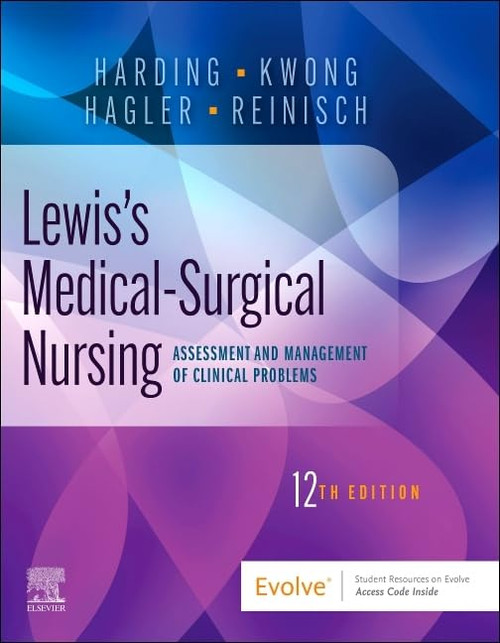Written by a dedicated team of expert authors led by Sharon Lewis, Medical-Surgical Nursing, 8th Edition offers up-to-date coverage of the latest trends, hot topics, and clinical developments in the field, to help you provide exceptional care in today's fast-paced health care environment. Completely revised and updated content explores patient care in various clinical settings and focuses on key topics such as prioritization, clinical decision-making, patient safety, and NCLEX exam preparation. A variety of helpful boxes and tables make it easy to find essential information and the accessible writing style makes even complex concepts easy to grasp! Best of all a complete collection of interactive learning and study tools help you learn more effectively and offer valuable, real-world preparation for clinical practice.
- Provides a strong foundation in medical-surgical nursing in a highly readable format.
- All content is written and reviewed by leading experts in the field to ensure that information is comprehensive, current, and clinically accurate.
- Colorful design and over 1,400 full-color illustrations clearly demonstrate disease processes and related anatomy and physiology.
- UNIQUE! A complete collection of study tools and resources, including the innovative Stress-Busting Kit for Nursing Students, offers engaging, interactive exercises and activities that make learning more effective and help prepare you for clinical practice.
- UNIQUE! Presents key nursing management content using a levels of care approach that explains how nursing care varies for different levels of health and illness.
- Approximately 55 comprehensive nursing care plans incorporate NIC, NOC, and current NANDA diagnoses, defining characteristics, expected outcomes, specific nursing interventions with rationales, evaluation criteria, and collaborative problems.
- Bridge to NCLEX Examination Review Questions at the end of each chapter focus on prioritization and help reinforce your understanding of key content.
- Evidence-Based Practice boxes summarize key interdisciplinary research and clearly demonstrate how it applies to nursing practice.
- Collaborative Management headings and Collaborative Care tables emphasize the importance of total patient care in today's health care settings and provide a clear understanding of each provider's role in managing disorders.
- Drug Alert boxes highlight important considerations applicable to key drugs.
- Healthy People boxes summarize government health care goals as they relate to specific disorders and identify important strategies for the prevention and early detection of diseases.
- Drug Therapy tables highlight vital medication information for quick reference.
- Nutritional Therapy tables summarize nutritional interventions and strategies for promoting healthy lifestyles in patients with various conditions.
- Cultural and ethnic health disparities content includes a dedicated chapter on health disparities and culturally competent care, as well as summary boxes highlighting important issues (including risk factors) related to the nursing care of various ethnic populations.
- Extensive gerontologic content discusses age-related changes for each body system and alerts you to differences often encountered in older patients.
- Emergency Management tables outline the treatment of health problems most likely to create medical emergencies.
- Health History tables summarize the key questions you should ask, as well as important assessment parameters.
- Patient and Caregiver Teaching Guides provide critical information to help you educate others who will be helping to care for the patient.
- Ethical Dilemmas boxes promote critical thinking for timely and sensitive issues such as informed consent, patient adherence, guardianship, confidentiality, and sterilization.
- Complementary and Alternative Therapies boxes summarize what you need to know about the clinical uses, effects, and nursing implications of herbal remedies, acupuncture, biofeedback, and more
- Genetics in Clinical Practice boxes cover key topics such as genetic testing, Alzheimer's disease, sickle cell disease, and genetics-related ethics issues.
- A glossary of key terms and definitions in the back of the book provides definitions and page references.
- Completely revised and revamped content is more readable, concise, and user-friendly.
- Reorganized coverage reflects an increased emphasis on more common disorders versus rare disorders.
- An increased focus on prioritization is featured throughout the text and in the review questions, nursing care plans, and case studies.
- Expanded coverage of delegation includes Delegation Decisions boxes throughout the text that highlight specific topics and skills related to delegation.
- End-of-chapter Clinical Decision-Making Exercises feature case scenarios that emphasize prioritization, delegation, and concept mapping.
- End-of-chapter review sections now feature alternate item-format questions.
- Safety Alerts highlight patient safety issues and focus on the latest National Patient Safety Goals.
- Pathophysiology Map flow charts make it easier to visualize and understand changes occurring in major diseases.
- Focused Assessment boxes reflect a realistic assessment on the run approach and offer brief checklists for evaluating the status of previously identified health problems and monitoring for signs of new problems.
- Assessment Case Studies for all assessment chapters help reinforce the importance of integrating and prioritizing assessment findings.
- UNIQUE! A separate Sleep and Sleep Disorders chapter expands upon this key topic that impacts multiple disorders and body systems, as well as nearly every aspect of daily functioning.
- UNIQUE! The Patient and Caregiver Teaching chapter emphasizes the increasing importance and prevalence of patient management of chronic illnesses and conditions, as well as the role of the caregiver in patient care.
- The Emergency, Terrorism, and Disaster Nursing chapter features expanded coverage of terrorism.
- Revised Infection chapter features updated infection control guidelines, an expanded section on emerging and reemerging infections, and new information about prions and H1N1 flu.











